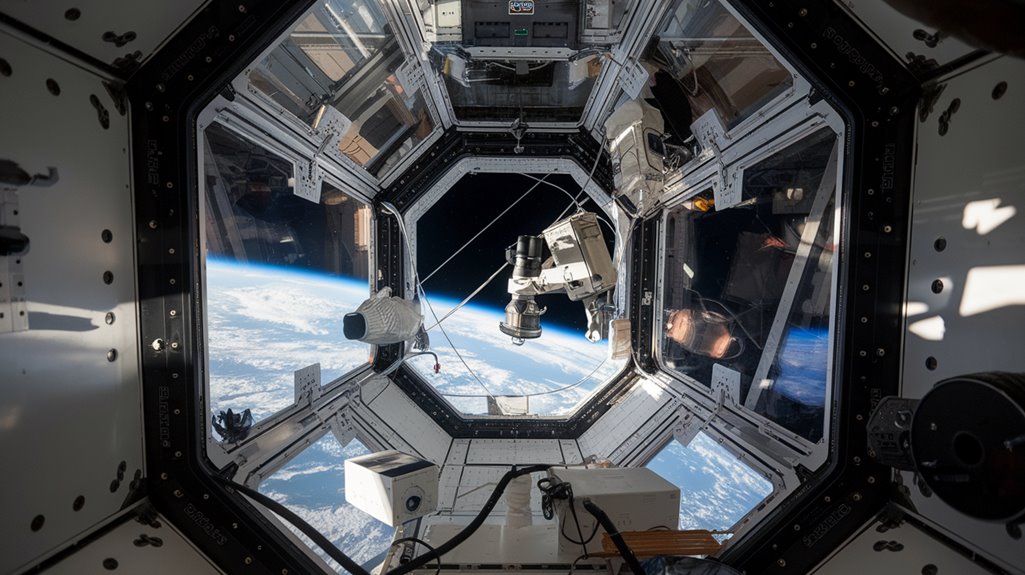Crime in Space? Who Prosecutes Beyond Earth?
Picture yourself floating in the inky void of space when suddenly you witness a crime unfolding on your spacecraft. You'd likely wonder who's in charge up here, millions of miles from the nearest courtroom. As humanity pushes further into the cosmos through space tourism and potential Mars colonies, you'll need to understand how law enforcement works beyond Earth's atmosphere. The rules aren't as clear-cut as you might think, and the answers could affect your next space adventure.
The Final Frontier Meets the Long Arm of the Law

While outer space has long captured humanity's imagination as a domain of endless possibilities, it's now becoming a complex arena for law enforcement and criminal justice.
You'll find that extraterrestrial law faces unprecedented challenges, from conducting forensic investigations in zero gravity to determining which nation can claim cosmic jurisdiction over criminal acts.
As space activities expand through commercial ventures and international missions, you're witnessing the evolution of legal frameworks to address these unique challenges. The Outer Space Treaty remains the cornerstone document that 114 nations have agreed to follow when addressing space-based legal matters.
With an increase in space tourism and potential colonization efforts, experts are calling for a criminal code framework that would apply uniformly across all space activities.
The establishment of organizations like USSPACECOM and initiatives such as the Combined Space Operations demonstrate how nations are working together to tackle space-related crimes.
You'll need to understand that traditional Earth-based legal systems don't easily translate to space, where different countries' varying legal standards and the absence of territorial sovereignty create complex jurisdictional puzzles.
Current Legal Framework for Crimes Beyond Earth
Despite the growing presence of humans in space, the legal framework for handling cosmic crimes remains a complex web of treaties, agreements, and jurisdictional challenges.
You'll find that current space treaties, including the 1967 Outer Space Treaty, don't fully address criminal jurisdiction beyond Earth. When it comes to extraterritorial jurisdiction, traditional principles that work on Earth aren't always suitable for cosmic infractions. Each participating nation retains criminal jurisdiction over their own personnel in space.
Key aspects you need to know:
- The ISS has its own intergovernmental agreement that determines jurisdiction based on the nationality of those involved.
- Commercial space vessels typically fall under the jurisdiction of their registration state.
Experts advocate for establishing a universal criminal code to address the increasing complexity of space-based activities.
- Space tourism is creating new legal complexities that existing frameworks weren't designed to handle.
- Current enforcement mechanisms lack a unified international authority to handle space-related crimes.
Understanding Jurisdiction in Space
Since human activity in space continues to expand, understanding jurisdictional frameworks has become essential for maintaining law and order beyond Earth's atmosphere.
You'll find that space law enforcement operates through a complex system where jurisdiction can be territorial, quasi-territorial, or personal. The launching state that registers a space object maintains jurisdiction and control over it.
While international space law sets the foundation, you'll notice significant jurisdictional implications when it comes to enforcement. Current frameworks face challenges in regulating private actors, and there's no single international authority to oversee space-related crimes.
That's why nations are working toward strengthened domestic laws and international cooperation through initiatives like CSpO and data sharing agreements to address these gaps in space law enforcement. The International Space Station takes a unique approach, where each partner nation retains jurisdiction over their elements and can apply their national laws to crimes committed in their respective modules.
Notable Cases and Real-World Examples
As space exploration continues to evolve, several groundbreaking criminal cases have emerged that test the boundaries of law enforcement beyond Earth.
You'll find that space law has been challenged by cases like astronaut Anne McClain's alleged unauthorized bank account access from the ISS, demonstrating how cybercrime can transcend Earth's atmosphere. The development of Canadian space laws marks a significant step toward establishing clearer jurisdiction for crimes committed in space and on celestial bodies. The Tokyo Convention approach to aircraft crimes serves as a potential model for addressing criminal behavior in space.
The illegal attempt to sell a Moon rock and the Russian satellite damage from Chinese debris further highlight the complexity of astronaut ethics and criminal jurisdiction in space.
- Unauthorized financial access from the ISS tests cybercrime jurisdiction
- Moon rock trafficking reveals challenges in space artifact protection
- Satellite damage raises questions about international liability
- Potential for serious crimes like assault or murder complicates space law enforcement
These cases underscore the urgent need for thorough criminal regulations in space, especially as commercial space activities expand.
Challenges in Prosecuting Space-Based Offenses

While prosecuting crimes on Earth presents its own set of challenges, pursuing justice in space multiplies these complexities exponentially.
You'll encounter jurisdictional confusion since no nation can claim sovereignty over outer space, though countries retain control over their registered spacecraft and personnel.
Forensic challenges become particularly formidable in space conditions, where evidence collection may be impossible or compromised.
Communication delays and limited resources further complicate investigations and trials. You can't easily conduct traditional court proceedings or implement standard sentencing alternatives when the accused is millions of miles from Earth.
The lack of a unified extraterrestrial criminal code, combined with different national legal systems, creates additional hurdles.
When crew members have essential mission duties, you're forced to balance justice with practical survival needs in the harsh space environment.
The Future of Criminal Justice in Space
Looking ahead to 2040 and beyond, you'll see revolutionary changes in how we handle criminal justice beyond Earth's atmosphere.
As space tourism expands and commercial activities flourish, extraterrestrial regulations will need to adapt through cosmic cooperation between nations and private entities.
Similar to Earth-based facilities that prioritize sustainable justice principles, space-based detention centers will need to balance security with environmental efficiency.
You'll witness these key developments in space-based justice:











